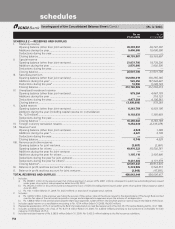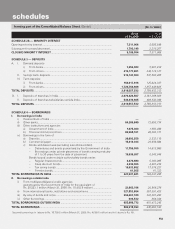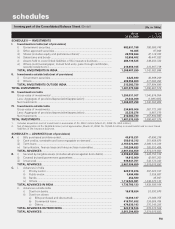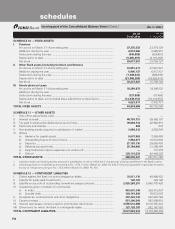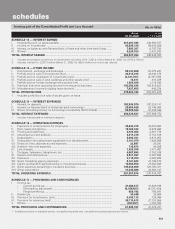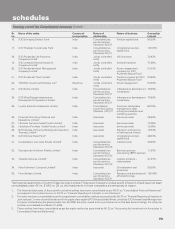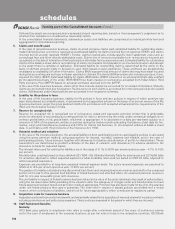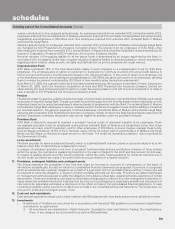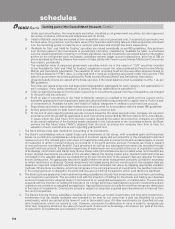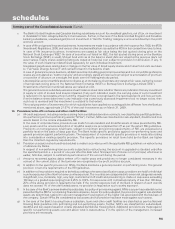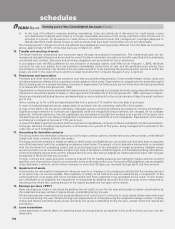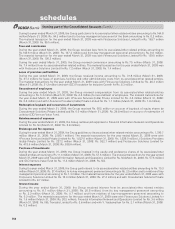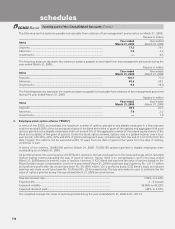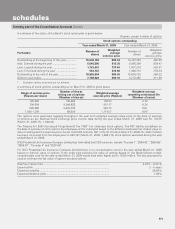ICICI Bank 2009 Annual Report Download - page 135
Download and view the complete annual report
Please find page 135 of the 2009 ICICI Bank annual report below. You can navigate through the pages in the report by either clicking on the pages listed below, or by using the keyword search tool below to find specific information within the annual report.
F61
to premium income arising on cancellation of policies are recognised in the period in which the policies are cancelled.
Commission on re-insurance business is recognised as income in the period of ceding the risk. Profit commission
under re-insurance treaties, wherever applicable, is recognised as income in the period of determination of profits and
combined with commission on reinsurance ceded.
In the case of general insurance business, insurance premium on ceding of the risk is recognised in the period in which
the risk commences. Any subsequent revision to premium ceded is recognised in the period of such revision. Adjustment
to re-insurance premium arising on cancellation of policies is recognised in the period in which it is cancelled. In case
of life insurance business, cost of reinsurance ceded is accounted for at the time of recognition of premium income
in accordance with the treaty or in-principle arrangement with the reinsurer. Profit commission on reinsurance ceded
is netted off against premium ceded on reinsurance.
In the case of general insurance business, premium deficiency is recognised when the sum of expected claim costs
and related expenses exceed the reserve for unexpired risks and is computed at a business segment level.
3. Stock based compensation and long term incentive plan
The following entities within the group have granted stock options to their employees:
ICICI Bank Limited
ICICI Prudential Life Insurance Company Limited
ICICI Lombard General Insurance Company Limited
ICICI Securities Limited
ICICI Venture Funds Management Company Limited
The Employee Stock Option Scheme (“the Scheme”) of ICICI Bank Limited provides for grant of equity shares of the Bank to
whole time directors and employees of the Bank and its subsidiaries. The Scheme provides that employees are granted an
option to acquire equity shares of the Bank that vests in a graded manner. The options may be exercised within a specified
period. ICICI Prudential Life Insurance Company Limited and ICICI Lombard General Insurance Company Limited have also
formulated similar stock option schemes for their employees. ICICI Securities Limited has approved an Employees Stock
Option Scheme for its employees.
The Group follows the intrinsic value method to account for its stock-based employee compensation plans. Compensation
cost is measured as the excess, if any, of the fair market price of the underlying stock over the exercise price on the grant
date. The fair market price is the latest closing price, immediately prior to the date of the Board of Directors meeting in
which the options are granted, on the stock exchange on which the shares of the Bank are listed. If the shares are listed on
more than one stock exchange, then the stock exchange where there is highest trading volume on the said date shall be
considered. The banking subsidiaries based out of Canada and UK account for the cost of the options granted to employees
by ICICI Bank using the fair value method based on Black Scholes model. In the case of ICICI Prudential Life Insurance
Company Limited, ICICI Lombard General Insurance Company Limited and ICICI Securities Limited, the fair value of the
shares is determined based on an external valuation report.
Since the exercise price of the Bank’s stock options is equal to the fair value price there is no compensation cost under the
intrinsic value method.
The Group’s venture capital subsidiary i.e. ICICI Venture Funds Management Company Limited has settled carried interest trusts
for the benefit of its employees. These trusts have investment in a separate class of units of certain fully consolidated funds.
These carried interest entitlements are treated as employee compensation and are accounted for at the time of granting of the
awards by the trust to the employees. The liability is re-measured at each reporting date and the carried interest entitlements
are recognised as expense in the period of realisation of proceeds from the underlying investments of the funds.
The Finance Act, 2007 introduced Fringe Benefit Tax (“FBT”) on the employee stock options. The FBT liability crystallises
on the date of exercise of stock options by the employees and is computed on the difference between fair market value
on the date of vesting and the exercise price. FBT is recovered from the employees as per the Scheme.
Long term incentive plan
ICICI Prudential Asset Management Company Limited has initiated Long Term Incentive Plan 2008 (‘LTIP 2008’) during
the year. The LTIPs of prior years comprise of LTIP 2005, LTIP 2007, LTIP Special Grant and LTIP Series 2 which are partly
vested. These plans are based on bonus points, which are encashable, after they are held for a specified period i.e. the
holding period at a determined price. The determined price is arrived at based on the trailing four quarter earnings per share
and the price earning (‘P/E’) multiple.
Provision for the bonus points is made in the books for the value of the points over the holding period. The outstanding bonus
points are revalued at the end of each reporting period and the difference is adjusted over the holding period. Further, in
respect of bonus points not encashed beyond the holding period, full provision is made for appreciation/depreciation in value
at the end of each reporting period. The schemes are launched only after approval of the Board of Directors of the entity.
4. Income taxes
Income tax expense is the aggregate amount of current tax, deferred tax and fringe benefit tax borne by the Group. The
income tax provision is determined in accordance with the Income Tax Act, 1961. Deferred tax adjustments comprise of
changes in the deferred tax assets or deferred tax liabilities during the year.
Deferred tax assets and liabilities are recognised on a prudent basis for the future tax consequences of timing differences
arising between the carrying value of assets and liabilities and their respective tax basis, and carry forward losses. Deferred tax
assets and liabilities are measured using tax rates and tax laws that have been enacted or substantively enacted at the balance
sheet date. The impact of changes in the deferred tax assets and liabilities is recognised in the profit and loss account.
forming part of the Consolidated Accounts (Contd.)
schedules



